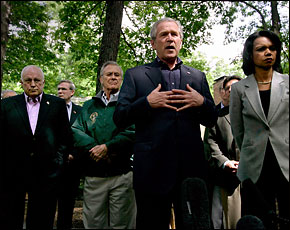“‘I was sorry for staying in the bathroom. I should have died like them,’ recalls Safa, who now lives with a cousin. ‘The Americans are murderers, criminals. They have no mercy.'” So much for hearts and minds. Obviously, the big news over the past week has been the nightmarish revelations of the atrocities at Haditha, which have moved the Senate to hearings (and some moderate Senators to consternation with Rumsfeld), re-fueled anti-American sentiment around the world, demonstrated once again the corrosive consequences of this administration’s pathetic lack of planning and leadership in Iraq, and forced us all to wonder anew exactly what the hell is going on over there that’s led to the deaths of approximately 40,000 Iraqi civilians. “‘People were taking steroids, Valium, hooked on painkillers, drinking. They’d go on raids and patrols totally stoned.’ Hicks, who volunteered at the age of 17, said, ‘We’re killing the wrong people all the time, and mostly by accident. One guy in my squadron ran over a family with his tank.‘”


